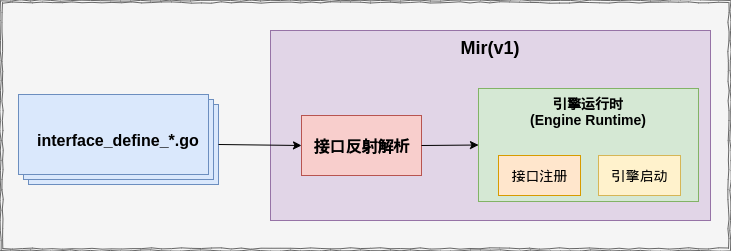go-mir v1.0.2 发布了,推荐使用。
小版本更新
预告下一版本开发计划
前段时间忙于公司业务,go-mir断更了好长时间,现在有闲余时间,正在筹划着go-mir的升级。
go-mir v1的架构大体是这样:
![go-mir-v1-arc]()
这套架构主要是使用了golang的反射机制对struct tag解析然后注册路由信息到web engine,只影响启动时间,不会有运行时损耗,总体来说,方便了接口定义,对代码组织很有益处。
go-mir v2版本正在筹划中,已经开始敲代码了,大体架构如下:
![go-mir-v2-arc]()
v2版本将升级采用代码生成的方式生成接口代码,同样也是采用golang内置的struct tag定义路由信息,但不同于v1版本在引擎启动时解析后注册路由信息到web引擎,这里参考grpc的接口生成方式,生成接口定义文件,业务逻辑只要实现了接口,注册接口实现的对象到相应的web引擎,启动后就可以对外通过RESTfull接口获取服务。
go-mir v3版本将会直接使用OpenAPI v3定义接口,大体架构如下:
![go-mir-v3-arc]()
v3版本将使用OpenApi v3.0的定义文件直接生成接口代码,后面的逻辑和v2保持一致。使用OpenAPI v3.0定义RESTfull API接口非常清晰、方便的,一直都想从OpenApi 的定义文件直接生成golang接口文件,go-mir v3版本将提供这个特性的支持,敬请期待。
使用go-mir构建web服务的样例代码
go-mir 是一个使用 golang 结构体标签信息将方法注册为 http engine handler 的辅助库,目前支持将方法注册到 Gin, Echo, Iris, Macaron, Mux, httprouter, go-chi。
主要功能:
-
使用 go 结构体标签定义 handler 的路由信息用于注册
-
通过反射机制根据结构体标签信息获取结构体方法,并依据结构体标签信息注册到相应的 http engine 中,比如 Gin, Echo, Iris, Macaron, Mux, httprouter, go-chi
-
使用结构体方法编写 http handler
-
使用结构体标签定义 Middleware 信息,并注册到 http engine 中
代码示例:(eg: gin backend)
go get github.com/alimy/mir/module/gin@master
package main
import(
"github.com/alimy/mir"
"github.com/gin-gonic/gin"
"net/http"
mirE "github.com/alimy/mir/module/gin"
)
type site struct {
Chain mir.Chain `mir:"-"`
Group mir.Group `mir:"v1"`
index mir.Get `mir:"/index/"`
articles mir.Get `mir:"/articles/:category/#GetArticles"`
}
// Index handler of the index field that in site struct, the struct tag indicate
// this handler will register to path "/index/" and method is http.MethodGet.
func (h *site) Index(c *gin.Context) {
c.String(http.StatusOK, "get index data")
}
// GetArticles handler of articles indicator that contains Host/Path/Queries/Handler info.
// Path info is the second or first(if no host info) segment start with '/'(eg: /articles/:category/#GetArticles)
// Handler info is forth info start with '#' that indicate real handler method name(eg: GetArticles).if no handler info will
// use field name capital first char as default handler name(eg: if articles had no #GetArticles then the handler name will
// is Articles)
func (h *site) GetArticles(c *gin.Context) {
c.String(http.StatusOK, "get articles data")
}
func main() {
//Create a new gin engine
engine := gin.New()
// Register handler to engine by mir
mirE.Register(engine, &site{Chain: gin.HandlersChain{gin.Logger()}})
// Start gin engine serve
engine.Run()
}







